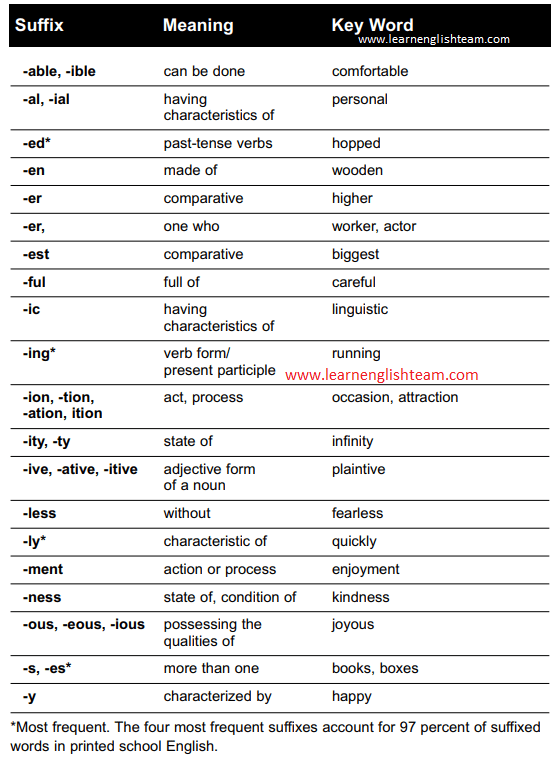Common Suffixes in English (With Examples) & PDF
In this article, we’ll learn about common suffixes in English and how to use them. Suffixes are added to the back of the base word to create a new word with a different meaning. Suffixes are like little keys that help us create new words and express different meanings.
What is a Suffix?: Let’s start with the basics. A suffix is like a tail for a word. It’s a group of letters we add to the end of a word to change its meaning or how it works in a sentence. Think of it as a tool that turns ordinary words into extraordinary ones!
How Suffixes Work: You’ll find suffixes hanging out at the end of words, ready to transform them. For instance, when we add “er” to “teach,” it becomes “teacher,” showing someone who teaches. Simple, right?
Changing Meanings: Suffixes have the power to change a word’s meaning. Take the word “create.” If we add “ion” at the end, it becomes “creation,” signaling the act of creating something. See? Suffixes are important.
Why Suffixes Matter: Suffixes help us express ideas more precisely. They change the meaning of basic words, allowing us to speak and write with flair. Learning suffixes is like getting superhero powers for your words! Suffixes are your secret allies in the English language adventure. They’re here to make your words richer, your sentences more vibrant, and your communication skills stronger.
Common Suffixes and What They Do: Let’s meet some friendly suffixes and see what they can do:
| Suffix | Meaning | Examples |
|---|---|---|
| -able | capable of being | drinkable, countable, avoidable |
| -al | having the form or character of | central, political, national, optional, professional |
| -ent | tending toward | different, dependent, excellent |
| -ful | notable for | beautiful, peaceful, careful |
| -ive | having the nature of | attractive, effective, imaginative, repetitive |
| -less | without | endless, homeless, careless, thoughtless |
| -ous | characterized by | continuous, dangerous, famous |
| -er | one who | teacher, writer, dancer |
| -est | superlative form | tallest, fastest, strongest |
| -ish | somewhat or like | reddish, childish, stylish |
| -ism | state or quality | optimism, socialism, realism |
| -ize | to make or become | organize, specialize, characterize |
| -tion | state or quality of being | creation, communication, dedication |
| -ness | state or condition | happiness, kindness, darkness |
| -ly | in a certain manner | quickly, happily, slowly |
| -y | characterized by | sunny, rainy, funny |
| -ify | to make or cause | simplify, amplify, terrify |
Here are examples of common suffixes and their functions:
1. -er:
Serves as a suffix to create a noun indicating a person or thing that performs an action.
Example: Teacher, singer, writer.
2. -ly:
Functions as a suffix to create an adverb indicating the manner in which an action is performed.
Example: Quickly, softly, happily.
3. -ful:
Adds to nouns to create adjectives expressing the presence of qualities.
Example: Beautiful, helpful, joyful.
4. -tion:
Transforms verbs into nouns, indicating an action, process, or result.
Example: Celebration, exploration, organization.
5. -ed:
Usually added to verbs to create the past tense or past participle.
Example: Walked, talked, danced.
6. -less:
Attaches to nouns to form adjectives, conveying the absence of a quality or characteristic.
Example: Careless, fearless, endless.
7. -ment:
Turns verbs into nouns, denoting an action, process, or state.
Example: Movement, development, excitement.
8. -ing:
Typically added to verbs to create the present participle, indicating an ongoing action.
Example: Running, swimming, playing.
9. -ly:
Used to form adjectives from nouns, indicating the presence of a quality.
Example: Manly, friendly, scholarly.
10 -ize:
Adds to nouns or adjectives to form verbs, often indicating a process or transformation.
Example: Organize, analyze, specialize.
Here are some common verb-to-noun suffixes along with examples:
1. -tion / -sion:
Example: Create → Creation, discuss → Discussion
2. -ment:
Example: Govern → Government, move → Movement
3. -ance / -ence:
Example: Attend → Attendance, differ → Difference
4. -ing:
Example: Teach → Teaching, run → Running
5. -al:
Example: Arrive → Arrival, arrive → Arrival
6. -er / -or:
Example: Create → Creator, teach → Teacher
7. -ship:
Example: Friend → Friendship, leader → Leadership
8. -age:
Example: Pack → Package, manage → Management
9. -hood:
Example: Brother → Brotherhood, neighbor → Neighborhood
10 -ity / -ty:
Example: Create → Creativity, activate → Activity
Suffixes List PDF
Suffixes in-English With Examples PDF – download



